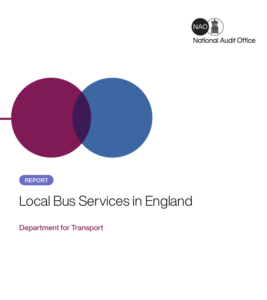Patronage still not recovered to pre-Covid levels – NAO report
Bus services in England have not recovered to pre-Covid levels which were already in decline, according to a new report from the National Audit Office (NAO). This is despite a number of interventions from the Department for Transport (DfT) to try to improve services.
National Audit Office (NAO). This is despite a number of interventions from the Department for Transport (DfT) to try to improve services.
Service use has not recovered to pre-Covid levels, with total number of bus journeys down by 9% in 2023-24, compared to 2019-20. The £2 bus fare cap introduced in 2023 contributed to an estimated 5% increase in bus usage but did not address other barriers to choosing buses, which the NAO giving the examples of poor frequency and reliability. The government introduced a £3 bus fare cap in January 2025, which is due to end in March 2027.
The DfT’s bus improvement plans have been a positive step, and the department’s work has improved how local government and bus operators work together, but many of the schemes to prioritise bus travel are yet to be delivered, according to the NAO.
The Office says DfT’s approach currently requires all local transport authorities who are not pursuing franchising to develop enhanced partnerships with local bus operators, but the way these work can be improved. NAO continued: “Franchising remains, according to local authorities, a difficult and expensive model to adopt. Bus operators are more reliant on public funding, which now accounts for half of their revenue. And they report their own issues, citing increased costs, particularly relating to wages and fuel.”
Financial pressures on local authorities have led many to scale back their transport planning and delivery capacity, the NAO notes. The local authorities report skills shortages and staff retention issues at a time when more responsibilities for buses are being devolved.
DfT recognises many of the issues hampering the development of better and more well-used bus services, according to the NAO. But the report concludes that the department should develop its understanding of which capabilities different local transport authorities will need, to better target the support they receive.
It also recommends that DfT clearly and consistently communicates what its long-term strategic ambitions for bus services are – and sets out underlying plans so that the sector can organise itself to deliver them.
“DfT should work with local transport authorities and the bus sector to maximise the impact of the available resources in reversing the decline in bus usage” – Gareth Davies, head of the NAO
Gareth Davies, head of the NAO, said: “Bus travel should be an easy and reliable transport choice but government’s attempts to improve services have not always worked. DfT should work with local transport authorities and the bus sector to maximise the impact of the available resources in reversing the decline in bus usage.”
More support needed
Silviya Barrett of Campaign for Better Transport said: “The Government has laudable ambitions to improve bus services, but lack of capacity in local authorities is a major roadblock, with half of local authorities painfully aware that their capacity to deliver local transport is poor. The Bus Centre of Excellence offers valuable help, alongside capability grants, but more support is needed, especially if franchising is to be a viable option for more local authorities.”
Silviya added: “Government funding to improve buses must be directed where it is needed most. Step one is to identify gaps in bus provision – we are working with Government on how this can best be achieved, so that the funding announced in the Comprehensive Spending Review can have maximum impact.”